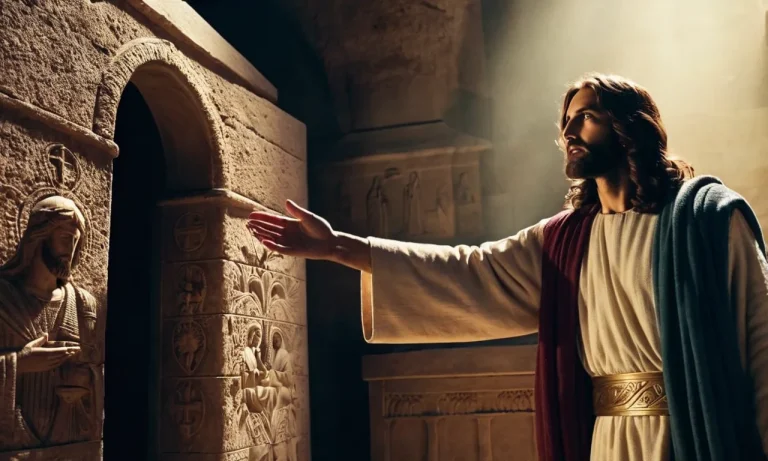Who Is In Heaven Now According To The Bible
If you have ever wondered who has made it to heaven according to the Bible, you’re not alone. Many people are curious about the inhabitants of the afterlife. In this comprehensive article, we will examine what the Bible says about who is in heaven now.
If you’re short on time, here’s a quick answer to your question: According to the Bible, those who have accepted Jesus Christ as their Lord and Savior and have lived righteously are in heaven now. This includes saints and martyrs from biblical times to the present day.
Righteous Followers of God Before Jesus’ Time
Abel
Abel was the second son of Adam and Eve and the first person recorded in the Bible as righteous and pleasing to God (Genesis 4:4). His offering of the firstborn of his flock was accepted by God, while his brother Cain’s offering from the fruit of the ground was rejected.
This made Cain jealous, and he murdered Abel. Though his life was short, Abel’s faith pleased God, and he is commended in Hebrews 11 as a righteous man. Abel is a model of trusting and obeying God despite opposition.
Enoch
Enoch is another early example of an Old Testament saint, walking in fellowship with God. Genesis 5:24 says that Enoch walked with God, and Hebrews 11:5 explains that he pleased God because of his faith. Enoch never died, but God “took” him. He did not see death.
Like Elijah later on, God miraculously raptured Enoch into his presence in heaven. Enoch sets an example of having such an intimate walk with God that he did not even taste death.
Noah
Noah stands out among his generation as the only follower of God left on earth (Genesis 6:8-9). When God saw the wickedness and violence that had spread everywhere, He told Noah of His plan to destroy the world with a flood and commanded him to build an ark.
Noah’s faithful obedience to God’s instructions and his trust in God’s promise to keep him safe through the flood make him one of the premier examples of righteousness in the Old Testament. Because of his faith, his family was saved to repopulate the earth after the flood.
Abraham, Sarah, Isaac and Jacob
Abraham is called the father of all who believe (Romans 4:11) and the friend of God (James 2:23). His life is marked by faith in God’s promises, even being willing to sacrifice his promised son Isaac in obedience to God (Genesis 22).
Abraham left his homeland to go where God called him (Hebrews 11:8). Sarah shared in Abraham’s faith, even laughing in delight at the promise of a son in her old age (Genesis 18:12). Their son Isaac continued the legacy of faith, blessing his sons Jacob and Esau regarding the future.
Jacob wrestled with God and prevailed, demonstrating his tenacity of faith and desire for God’s blessing. This faithful family inherited the promises of God, demonstrating trust in God over a lifetime.
Moses and Other Old Testament Figures
Moses’ courageous leadership and trust in God makes him an outstanding example of an Old Testament saint. He confronted Pharaoh and led the Israelites out of Egyptian slavery (Exodus 3-15). He also received the Law from God on Mount Sinai (Exodus 19-20).
Joshua, Rahab and others showed great faith when conquering Jericho (Joshua 2; 6). Gideon trusted God would deliver Israel through his small army of 300 (Judges 6-7). Deborah was a wise judge and prophetess of Israel (Judges 4-5).
David passionately pursued God through all his ups and downs as king (1 and 2 Samuel). Elijah boldly confronted evil rulers in obedience to God (1 Kings 18). Daniel and his friends displayed courage in captivity by refusing to obey the king’s orders to compromise their faith (Daniel 1-6).
This “cloud of witnesses” (Hebrews 12:1) gives inspiring Old Testament examples of godly men and women who trusted God and displayed faith in their words and actions. They are forerunners of Christ and models for us as people declared righteous because of their faith.
The Apostles and Other New Testament Figures
Mary, Mother of Jesus
Mary, the mother of Jesus, holds a very special place in heaven as the woman chosen to bear the Savior of the world. Though little is said about her in Scripture, Mary’s humble faith and obedience undoubtedly earned her a place of honor in paradise.
According to Catholic and Orthodox teaching, Mary was assumed directly into heaven and is revered as the Mother of God.
John the Baptist
John the Baptist was Jesus’ cousin and the one prophesied to prepare the way for the Messiah. John boldly declared the coming of God’s kingdom and called people to repentance. Though he was martyred for his faith, Jesus said that no one born of woman was greater than John the Baptist (Matthew 11:11).
His courageous faith surely earned him a place in heaven.
The Twelve Apostles
The 12 disciples chosen by Jesus – later called apostles – were the foundation stones of the early church after Jesus’ ascension. According to Scripture, they will sit on thrones in heaven judging the 12 tribes of Israel (Luke 22:30).
The apostles, especially Peter, James, and John, were the closest to Jesus during his earthly ministry. Their intimacy with Christ and leadership in the church undoubtably earned them heavenly rewards.
Stephen
Stephen was the first Christian martyr, killed for preaching the gospel in the Book of Acts. As he was being stoned to death, Stephen looked into heaven and declared he saw Jesus standing at God’s right hand.
Surely as the first to give his life for Christ, Stephen has a special place in paradise near the Savior he gazed upon as he died.
Paul
Though once a persecutor of Christians, Paul went on to author a large part of the New Testament after a radical conversion to Christ. As one of the most influential missionaries and church planters, Paul likely holds a place of honor in heaven for his faithful service.
According to his own words, Paul looked forward to receiving the “crown of righteousness” Christ would award him in heaven (2 Timothy 4:8).
Post-Biblical Saints and Martyrs
Throughout history, there have been many saints and martyrs who lived after the time period recorded in the Bible. These holy men and women dedicated their lives to serving God and spreading the gospel message.
Though not mentioned in the pages of Scripture, they have an important place in the ongoing story of Christianity.
Early Christian Martyrs
In the first few centuries after Christ, the early Christian church endured intense persecution under various Roman emperors. Many believers were martyred for their faith, refusing to renounce Jesus even under threat of death. Famous martyrs from this time period include:
- Polycarp – Bishop of Smyrna who was burned at the stake around AD 155.
- Perpetua and Felicity – Young noblewoman and her slave who were killed by wild beasts in the arena in AD 203.
- Cyprian – Bishop of Carthage who was beheaded in AD 258.
- Agnes – Young girl who was killed for refusing marriage to a pagan man around AD 304.
The courage of these and many other early martyrs helped strengthen and spread the faith in the face of opposition.
Monks and Hermits
In the 3rd and 4th centuries, some Christians began retreating from society to live ascetic lives of prayer and solitude in the desert. This “Desert Father” movement produced many holy men and women, including:
- Anthony the Great – Inspiration for Christian monasticism, lived as a hermit in Egypt from AD 270-356.
- Pachomius – Founded early Christian monastic communities in Egypt in the 4th century.
- Mary of Egypt – Renowned desert hermit who repented of a sinful youth.
- Simeon Stylites – Lived for 37 years atop a pillar in Syria, inspiring many imitators.
This monastic movement spread across Christendom and still influences religious orders today.
Middle Ages and Beyond
In the Middle Ages, saint veneration became more common in the Catholic Church. New saints were officially canonized through a formal process. Some famous post-biblical saints from this era include:
- Augustine – Influential theologian and bishop from 354-430 AD.
- Patrick – Christian missionary to Ireland in the 5th century.
- Francis of Assisi – Founded the Franciscan Order in 1209 AD.
- Thomas Aquinas – Dominican scholar and theologian from 1225-1274.
- Teresa of Ávila – 16th century Spanish mystic and monastic reformer.
- John of the Cross – Major figure in Catholic Counter Reformation alongside Teresa.
In modern times, Mother Teresa, John Paul II, and Oscar Romero are some of the more recently canonized saints recognized for lives of heroic virtue and sacrifice.
The stories of post-biblical saints and martyrs provide ongoing inspiration and encouragement for believers through the centuries. Their lives give witness to God’s power and grace at work in each generation.
All True Believers in Jesus Christ
Must Accept Jesus as Lord and Savior
The Bible clearly states that in order to enter Heaven, one must accept Jesus Christ as their personal Lord and Savior (John 3:16). This means realizing that we are all sinners in need of salvation that only comes through Jesus’s sacrificial death on the cross.
True believers place their complete faith and trust in Christ’s finished work, not in their own good works or religious deeds. As Jesus said, “I am the way and the truth and the life. No one comes to the Father except through me” (John 14:6).
Must Repent of Sins
In addition to accepting Jesus, the Bible calls all people to repent of their sins in order to inherit eternal life (Acts 3:19). Repentance is not just feeling remorseful, but a sincere commitment to turn away from all wickedness and worldly passions.
True repentance will be accompanied by changed thinking and behavior over time. Even after conversion, believers must continue to regularly confess and repent of sins they commit (1 John 1:9). Walking in holiness is essential proof of belonging to Christ.
Must Live Righteously
While good works cannot earn salvation, the Bible makes clear that true believers in Jesus will live consistently righteous lives as evidence of their conversion (Matthew 3:8). All who have been born again and have the indwelling Holy Spirit will exhibit good fruits of the Spirit such as love, joy, peace, patience, kindness, goodness, faithfulness, gentleness and self control (Galatians 5:22-23).
Their character will progressively become more Christlike. Though stumbling into sin at times, they will not persist in wickedness as a lifestyle.
| Website | URL |
|---|---|
| GotQuestions.org | https://www.gotquestions.org/heaven.html |
| BibleStudyTools.com | https://www.biblestudytools.com/bible-verses/topics/heaven/ |
Conclusion
In summary, the Bible indicates that those who have lived faithfully following God before and after the time of Jesus Christ are now citizens of heaven. This includes many biblical figures like the prophets and apostles.
It also includes all who have devoted their lives to Christ since then, whether recognized as saints and martyrs or ordinary believers.
While we cannot know the full list of heaven’s inhabitants, we can be confident that all who have truly trusted in Jesus are there now, worshipping God for eternity. The Bible urges us to live holy lives so that we too may join them one day.








